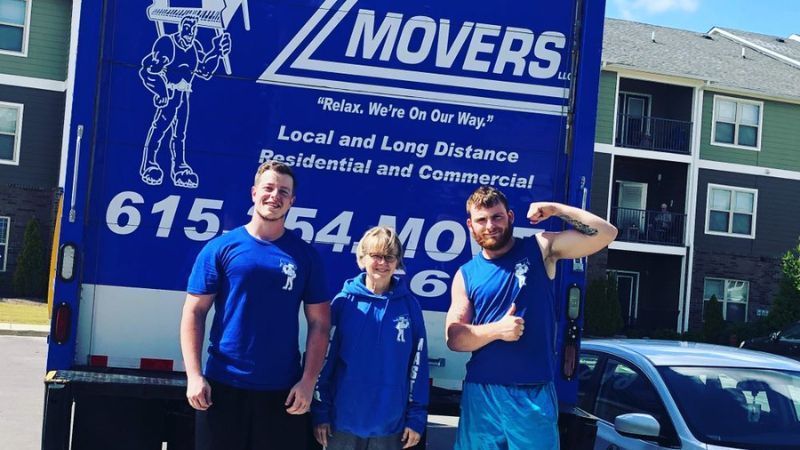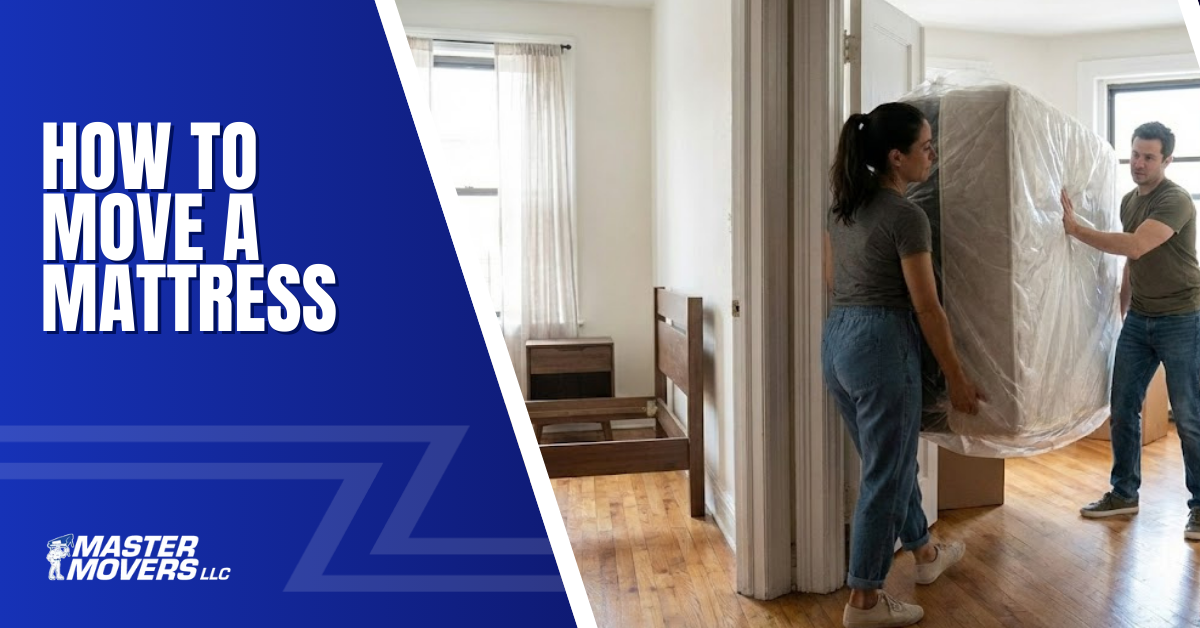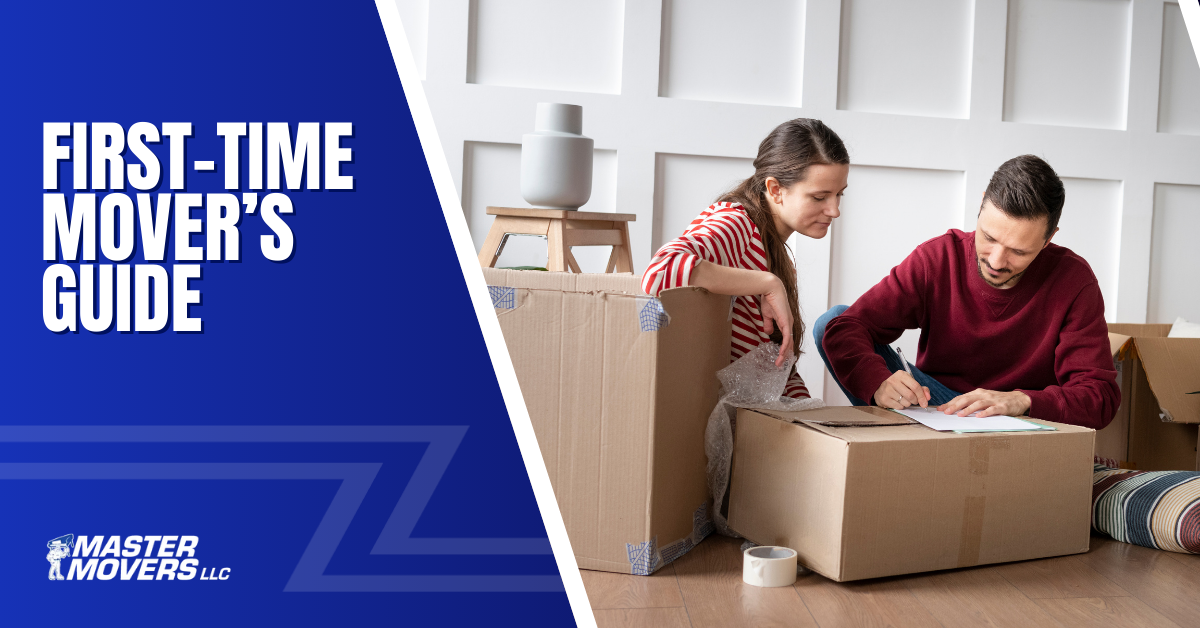A Smooth Apartment Moving Day
May 29, 2024

Planning your apartment moving day starts with knowing your timeline. Timing is crucial to ensuring everything runs smoothly. Nashville Master Movers, our full-service
moving company based in Nashville, TN
, takes care of every aspect of your move. If you're considering such a move, understanding these differences is essential for a smooth transition.

Creating a Moving Checklist
A moving checklist is essential for staying organized. Break it down into weekly tasks to ensure you don't overlook important details.
Informing Key Stakeholders
When preparing for your apartment move, remember to inform key stakeholders. Here’s a list of who you should notify:
Living Room : Begin by packing away non-essential décor. For furniture, use protective blankets to prevent scratches. Kitchen : Start with appliances you rarely use. Label all boxes clearly with contents and any specific handling instructions (fragile, this side up). Bedroom : Pack clothes you won't need right away, prioritizing out-of-season items. Utilize wardrobe boxes to keep hanging clothes wrinkle-free. Bathroom : Pack toiletries last, ensuring essentials are easily accessible for your first night. Office: Securely pack electronic devices and clearly label all cords to avoid confusion later. Use file boxes to keep important documents organized. Garage/Basement: Sort through your belongings. Donate or dispose of anything unused. Remember to use sturdy boxes for heavy tools and equipment to prevent damage during transport.
Thank you for considering Nashville Master Movers for your moving needs! If you have any more questions or would like to receive a personalized quote, don’t hesitate to reach out to us. Moving doesn’t have to be stressful when you have the right team by your side.
- Utility Providers: Inform your electric, gas, water, and internet providers.
- Financial Institutions: Update your address with banks and credit card companies.
- Employers: Make sure your employer has your new address on file.
- Post Office: Submit a change of address form online.
- Subscriptions: Update your address for any magazine, food, or other subscription services.
- Friends and Family: Let them know your new address and moving day schedule.
Categorizing Items by Room
Packing by room is a great way to stay organized and make unpacking easier. However, having a reliable moving company like Nashville Master Movers our packing services in Nashville are your tailored option if you don’t have time and knowledge to pack your belongings properly. Here’s how to tackle each room:Living Room : Begin by packing away non-essential décor. For furniture, use protective blankets to prevent scratches. Kitchen : Start with appliances you rarely use. Label all boxes clearly with contents and any specific handling instructions (fragile, this side up). Bedroom : Pack clothes you won't need right away, prioritizing out-of-season items. Utilize wardrobe boxes to keep hanging clothes wrinkle-free. Bathroom : Pack toiletries last, ensuring essentials are easily accessible for your first night. Office: Securely pack electronic devices and clearly label all cords to avoid confusion later. Use file boxes to keep important documents organized. Garage/Basement: Sort through your belongings. Donate or dispose of anything unused. Remember to use sturdy boxes for heavy tools and equipment to prevent damage during transport.
Packing Fragile Items
Fragile items require extra care. Here are some tips:- Use Appropriate Packing Material:
- Use bubble wrap, packing peanuts, or foam sheets.
- Reinforce boxes with packing tape.
- Wrap Items Individually:
- Wrap each item separately and securely.
- Use soft materials like towels or linens for added padding.
- Label Boxes as Fragile:
- Clearly mark boxes with “Fragile” and “This Side Up” labels.
- Inform movers about these boxes for extra precaution.
- Pack Dishes Vertically:
- Place plates vertically in boxes for better support.
- Use dividers for glasses and mugs.
Labeling and Organizing Boxes
Proper labeling and organizing save a lot of headaches when unpacking. Here's how to do it right:- Label Each Box Clearly:
- Write the destination room in big letters.
- List the key contents on the box.
- Use Color-Coding:
- Assign a color to each room (e.g., green for kitchen, blue for bathroom).
- Use colored tape or stickers.
- Number Your Boxes:
- Keep an inventory of boxes by number.
- Note any high-value or essential items in a separate list.
- Label on Multiple Sides:
- Mark labels on at least three sides for easy identification.
- Ensure labels are legible and protected from damage.
Reserving a Hiring Movers
Choosing between renting a moving truck or hiring movers is an essential decision in your moving process. Hiring Professional Movers:- Pros:
- Less physical strain and stress.
- Professional packing and handling of items.
- Insurance coverage for your belongings.
Determining the Optimal Moving Day and Time
Selecting the right day and time for your move can save you a lot of hassle. Consider these tips:- Avoid Peak Moving Seasons:
- Moving rates and availability peak during the summer and end-of-month days.
- Opt for mid-week and mid-month if possible.
- Consider Weather Conditions:
- Move during mild weather to avoid extreme heat or cold.
- Keep an eye on weather forecasts as the moving day approaches.
- Time of Day:
- Start early in the morning to maximize daylight and avoid peak traffic hours.
- Weekends may be more convenient but also more expensive.
Packing Supplies List
Having the right packing supplies can make a significant difference. Here’s a comprehensive list of what you’ll need:- Boxes:
- Small boxes for heavy items like books.
- Medium boxes for kitchenware and decor.
- Large boxes for lightweight bulky items like bedding.
- Specialty Boxes:
- Wardrobe boxes for hanging clothes.
- Dish packs for kitchenware and glassware.
- Protective Materials:
- Bubble wrap for fragile items.
- Packing peanuts for filling voids.
- Foam sheets for electronics.
- Additional Supplies:
- Packing tape and tape dispenser.
- Permanent markers for labeling.
- Stretch wrap for securing furniture.
Essentials Box for First Day
An essentials box contains items you'll need immediately on moving day and the first night in your new apartment. Here’s what to include:- Personal Items:
- Change of clothes
- Toiletries (toothbrush, toothpaste, soap)
- Kitchen Supplies:
- Snacks and easy-to-prepare meals
- Basic utensils (forks, knives, paper plates)
- Important Documents:
- IDs, lease agreement, moving inventory
- Cleaning Supplies:
- Trash bags, paper towels, all-purpose cleaner
- Medication:
- Any daily medications and a basic first aid kit
- Tools:
- Basic tool kit (screwdriver, hammer, tape measure
Securing the Safety of Children and Pets
Keeping children and pets safe during a move is essential. Here’s how:- Designate a Safe Zone:
- Create a safe area away from moving activities.
- Use gates or closed doors to restrict access.
- Hire a Babysitter or Pet Sitter:
- Consider professional care for children and pets on moving day.
- Ensure they are comfortable and taken care of.
- Prepare Essentials:
- Pack a bag with essentials for children (toys, snacks) and pets (food, water).
- Acclimate Pets:
- Help pets get used to travel carriers ahead of time.
- Keep a familiar item like a bed or toy in the new home to comfort them.
Last-Minute Checks and Preparations
Before the movers arrive or you start loading the truck, conduct some final checks and preparations:- Final Walk-Through:
- Go through each room to ensure nothing is left behind.
- Check closets, cabinets, and drawers one last time.
- Turn Off and Unplug Utilities:
- Ensure all appliances, lights, and electronics are turned off.
- Unplug everything to prevent any hazards.
- Protect the Property:
- Use door stoppers and floor protectors to prevent damage.
- Place cardboard or moving blankets along high-traffic areas.
- Secure Valuables and Essentials:
- Keep important documents, valuables, and the essentials box with you.
- Ensure these items are not packed in the moving truck by mistake.
Ensuring All Items are Loaded
Before the moving truck departs, make sure everything is packed and secured properly:
- Cross-Check Inventory List:
- Ensure every box and item is accounted for.
- Confirm with movers that everything is loaded.
- Secure and Seal the Truck:
- Ensure the truck is sealed properly before driving off.
- Use straps to secure items inside the truck to prevent shifting.
- Final Inspection:
- Perform a last check of the apartment to ensure nothing is left behind.
- Verify that all utilities are turned off and doors are locked.
Handling Unexpected Issues
Even with the best planning, unexpected challenges can arise on moving day. Here’s how to handle them:- Weather Changes:
- Have tarps and plastic sheeting ready to protect items from rain.
- Reschedule if weather conditions are dangerous, like severe storms.
- Last-Minute Cancellations:
- Confirm all reservations and bookings a few days prior to the move.
- Have a backup plan, such as an alternative moving company or extra help.
- Damaged Items:
- Document any damages with photos.
- Notify your moving company immediately to process claims.
- Lost Items:
- Cross-check your inventory list during loading and unloading.
- Keep valuable items with you to prevent loss.
Moving Into Your New Apartment
Once you arrive at your new apartment, it’s crucial to conduct a thorough inspection before unpacking:- Check for Pre-existing Damage:
- Look for any damage to walls, floors, and fixtures.
- Document with photos and notes to report to your landlord.
- Verify Utility Setup:
- Ensure that electricity, water, gas, and internet are functioning.
- Contact service providers immediately if there are any issues.
- Check Security Features:
- Test door locks, windows, and smoke alarms.
- Replace locks if necessary for added security.
- Record Cleanliness:
- Note the condition of the apartment upon arrival.
Setting Up Utilities and Services
Getting your utilities and services up and running is essential for settling into your new place:- Transfer or Set Up New Utilities:
- Arrange for electricity, gas, water, internet, and cable services.
- Coordinate installation appointments for internet and cable as needed.
- Schedule Any Installations:
- Book installation for any required services like internet or cable.
- Make sure someone is home to oversee installations.
- Update Address:
- Notify banks, insurance companies, and subscriptions of your new address.
- Submit a change of address with the post office.
Unpacking and Organizing
Unpacking can be overwhelming, but a systematic approach can make it manageable:- Start with Essentials:
- Unpack your essentials box first to have immediate access to necessary items.
- Set up the bathroom and kitchen first as they are essential for daily activities.
- Unpack One Room at a Time:
- Focus on one room to fully unpack and organize before moving to the next.
- Prioritize bedrooms and bathrooms initially for comfort.
- Organize as You Go:
- Utilize storage solutions such as shelves, bins, and closet organizers.
- Arrange items in a way that makes daily routines convenient.
- Dispose of Packing Materials:
- Recycle boxes and packing materials to keep the space organized and clean.
- Donate or sell packaging supplies if they are in good condition.
Cross-Checking Inventory
After everything is moved in, it's important to ensure that all your items have arrived and are in good condition:- Use Your Inventory List:
- Compare items in your home with the inventory list.
- Make sure all boxes and items are accounted for.
- Inspect for Damage:
- Open boxes and check for any signs of damage.
- Document and photograph any damaged items.
- Report Issues Immediately:
- Notify your moving company about any missing or damaged items.
- File claims as necessary within the given time frame.
Celebratory Rituals
Moving is a huge milestone, and once everything is settled, it’s time to celebrate your new home:- Housewarming Party:
- Invite friends and family to celebrate.
- Use this as an opportunity to show off your new place and make wonderful memories.
- Personalize Your Space:
- Add personal touches with decor, photos, and artwork.
- Create a cozy and inviting atmosphere that reflects your personality.
- Relax and Enjoy:
- Take a moment to relax and unwind.
- Treat yourself to a nice meal or an enjoyable activity to mark this new chapter.
Hiring Professional Movers
Benefits of Hiring Nashville Master Movers
Considering professional movers for your apartment moving day? Here are some advantages of choosing Nashville Master Movers:- Expert Handling:
- Experienced movers ensure your items are handled with care.
- Specially trained in packing, loading, and unloading.
- Efficiency:
- Professionals can complete the move quicker than doing it yourself.
- Saves you time and effort.
- Insurance and Safety:
- Your belongings are covered under insurance provided by Nashville Master Movers.
- Reduces the risk of damage or injury.
- Stress Reduction:
- Professionals manage end-to-end moving logistics.
- Allows you to focus on other aspects of your move.
- Special Equipment:
- Use of professional-grade equipment for safe moving.
Services Offered by Nashville Master Movers
Nashville Master Movers offers a comprehensive range of services to suit your moving needs:- Residential Moving:
- Full-service packing and unpacking.
- Transportation of all household items including furniture and personal belongings.
- Commercial Moving:
- Office relocations with minimal disruption to your business.
- Specialized handling of office equipment and documents.
- Packing Services:
- Professional packing to ensure items are safe during transit.
- Provision of packing materials like boxes and bubble wrap.
- Storage Solutions:
- Secure storage facilities for short or long-term needs.
- Ideal for interim storage during a move.
- Specialty Moves:
- Handling of delicate or high-value items such as pianos or artwork.
- Expertise in managing large, heavy, or awkwardly shaped items.
Thank you for considering Nashville Master Movers for your moving needs! If you have any more questions or would like to receive a personalized quote, don’t hesitate to reach out to us. Moving doesn’t have to be stressful when you have the right team by your side.



